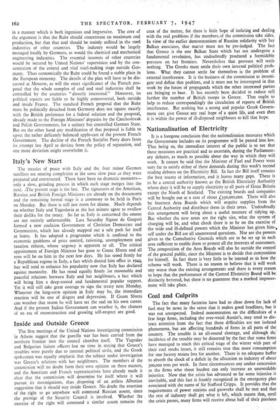Nationalisation of Electricity
It is a foregone conclusion that the nationalisation measures which the Government includes on its programme will be passed into law. That being so, the immediate interest of the public is to see that those measures are practical and to ascertain, during the Parliament- ary debates, as much as possible about the way in which they will work. It cannot be said that the Minister of Fuel and Power went very far to satisfy either of these demands during this week's second reading debates on the Electricity Bill. In fact the Bill itself remains the best source of information, and it. leaves many gaps. There is to be a central authority known as the British Electricity Authority whose duty it will be to supply electricity to all parts of Great Britain except the North of Scotland. The existing boards and companies will be bought out at a cost of about L350,000,000. There will also be fourteen Area Boards which will acquire supplies from. the Central Authority and distribute them in their areas. Undoubtedly this arrangement will bring about a useful measure of tidying up. But whether the new areas are the right size, what the system of charging will be, and what check there is to be on the exercise of the wide and ill-defined powers which the Minister has given him-, self under the Bill are all unanswered questions. Nor are the powers given to the Consultative Councils which are to be set up in each area sufficient to enable them to protect all the interests of consumers. The composition of the Area Boards will also be outside the control of the general public, since the Minister is to decide that Composition for himself. In fact there is Very little to be learned as lo how the scheme will work. There is no reason to believe that it will work any worse than the existing arrangements and there is every reason to hope that the performance of the Central Electricity Board will be distinctly bettered, but there is no guarantee that a marked improve- ment will take place.-


































 Previous page
Previous page